Iraqi widows: Lost 'love stories'
- Published
Conflict over much of the past three decades in Iraq has caused the number of widowed women to pass the one million mark. Here, Iraqi widows tell the BBC Arabic Service about their experiences, and hopes and fears for the future.
Nahla al-Nadawi, 44, Lecturer at Baghdad University
The day I had to bury my husband was the hardest day in my life. I was not able to grieve properly as I had to look after my son who suffers from autism.
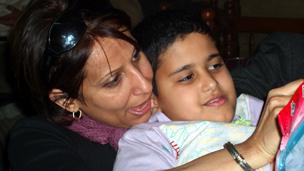
Nahla al-Nadawi says she still feels her husband's presence
My husband, Mohammad, was a surgeon and a refugee in Germany, but after the regime change in 2003, he returned to Iraq immediately. In mid-April 2007, an explosion occurred at al-Jadiriyah Bridge in Baghdad causing many deaths. There were 10 bodies that were completely charred. One of those was my husband.
Aseed, my son, who used to sleep every day on his father's chest to the sound of his heartbeat, felt the loss of his father immediately. For many days, he sat in the wardrobe wearing the same clothes. If any good has come out of his father's death, it made him more determined to face life.
I feel that my husband is still with us. He was a writer, a thinker and a painter and for that reason, I feel he has only died in physical form, and his works remain with us.
To get out of my crisis, I challenged myself to carry on. With the help of friends, I managed to get a second job, as well as training other widows on the art of living life after a crisis.
In fact, I was helping myself because I still could not overcome my own crisis.
Elham Mahdi, 42, Housewife in Baghdad
I have become the mother and father of four children ever since my husband was killed in a bus explosion on his way to work.
He left the house at eight that morning to get to the Shorja market in Baghdad where he worked as seller. But his life was over within half an hour.
We received compensation from the government, but it will never compensate for losing a loving father to four children.
Although we also get help from a local organisation which provides a monthly salary for my children, clothing for Eid [festival], and help at the start of the academic year, our living conditions are difficult, and I need more money to meet the needs of four growing children.
Razan Othman Mohammed, 29, Worker in Baghdad
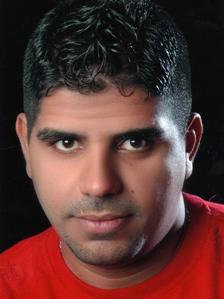
Razan Mohammed's husband was killed in an explosion
After a love story that lasted 10 years, one minute was all it took to lose my husband.
Back in 2008, my husband, his orphaned relative - who was only five years old - and I were caught up in a bomb explosion at the market. When the medics came to our rescue, a suicide bomber strapped with explosives set off another bomb. I lost consciousness at that moment and my body was full of shrapnel.
My husband died of his injuries on his way to the hospital and the orphaned child was badly injured. He is now disabled and no longer able to walk.
I have undergone five surgeries in the aftermath of the explosions. My condition was so serious that I didn't know my husband had died for three months, as the doctors advised my family to keep the news from me.
I have since moved back in with my parents and I look after myself using my own income.
I see myself in a better position compared to other widowed women since I do not have any children. But what about all the other young widowed women who have children? Who will support them?
Adawyia Mutar Hussein, 40, Najaf
I lost my husband while I was pregnant with our daughter, who is now six years old. She became fatherless even before she was born.
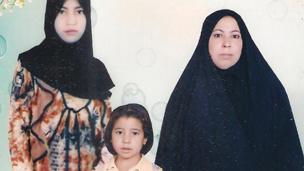
Adawyia Hussein struggles to provide for her two daughters
My husband was killed in 2004 in a family dispute and left me with two daughters to take care of, alone. I have tried to get my husband's entitlements but no-one seemed to help, neither the government nor my family.
My first source of income is from my neighbours and well-wishers who collect money for me every now and again. My second source is from working as a cleaner at party and wedding venues.
More than half of my income goes on rent for the house that I live in at the moment, which consists of one room. I currently live with my two daughters and my 35-year-old orphaned nephew who is completely disabled.
We want only one thing from the government, and that is a small piece of land to build the simplest house just to keep the family all together under one roof.
Huda Abd al-Hafith, 37, Baghdad
I am a mother of four children whose father used to work as a taxi driver. He left the house one day for work and never came back. After four days of absence, I found his tortured body in the local hospital.
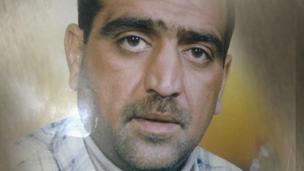
Huda Hafith's husband died in 2007
The criminal report into his death concluded that he died in a car-jacking attempt that went wrong and the case was closed. But I think the sectarian extremism that was prevalent at the time led to his torture and killing in 2007.
I now live alone with my four children in a rented one-bedroom house after I was kicked out of my old house. I receive a small amount of income support from the government, 150,000 dinars ($125; £80) per month, which does not even cover the rent of 200,000 dinars per month.
I work from home because I cannot leave my children alone at such a young age. I make and sell bread and food to the neighbours.
I'm not thinking of getting married again, I have tried my luck once and the children now are my main concern.
Majda al-Basrah, 60
The shock of his failed attempt to migrate to Germany back in 1995 led to my husband's death. We lost everything - our jobs, our house and money.
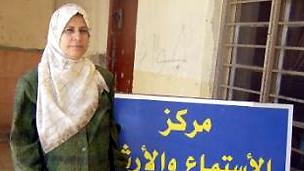
Majda al-Basrah works as a tailor to make ends meet
That year, the situation in Iraq was very difficult. I had problems at work mainly because I refused to become a member of the [then ruling] Baath Party.
We decided to travel to Jordan and move on from there to Germany, but we were not able to obtain a visa. Because of harsh conditions that we were facing in Jordan, we decided to return to Iraq and start our life from the beginning.
We bought a simple house and basic furniture with the money we had left. But after a year, my husband passed away, partly because he couldn't cope with the stress and pressures of life.
At the moment, I live alone in my house and I work as a tailor every now and then, and my family helps too with the finances.
I started receiving the widows' income support recently after help from my local council.
All the widows and divorced women in my area are receiving their income support because of the help of a kind man that works in the council.